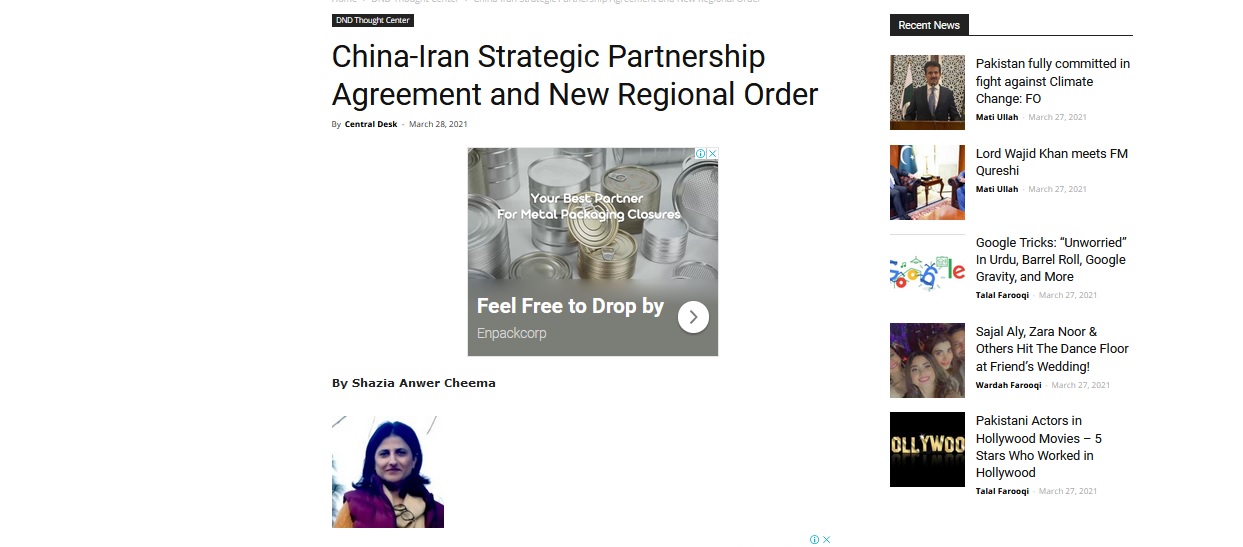Islamabad, Pakistan: Geostrategic and geopolitical experts have expressed their opinion that China Iran Strategic Cooperation will effectively counter US dominance in the region.
In an article published by DND Thought Center on Sunday, the majority of experts indicated that China’s strategic partnership not only promised to invest 4 billion US dollars in Middle Eastern oil and gas resources rather it will work to counter US dominance in the region and the accord also brought Iran into the grasp of the Belt and Road Initiative of China.

Ambassador (Retired) Syed Hasan Javed who is an author of seven books on China and is the Director of the Chinese Studies Centre, National University of Science and Technology (NUST), Islamabad said that China and Iran marked a strategic and historic breakthrough in China’s policy and relations with West Asia and with the Middle East and Gulf.
He was of the view that Chinese Foreign Minister Wang Yi began his official tour from Saudi Arabia in a carefully balanced and mature initiative and China’s move has disarmed the Western Powers of any narrative and further reduced them to utter irrelevance in the broader Middle East region.
“With China’s strategic entry into the West Asian region, the region is moving into doubly interesting times. Unlike the Western powers including the US, China maintains close relations with all the Arab states, Iran as well as Israel. It enjoys the widespread trust and credibility in the region. The US policy of War with no end has isolated it and damaged long-term Western interests irreparably,” commented Ambassador Hasan Javed.
Senator Mushahid Hussain Syed who is known for strengthening the foreign relations with China and Central Asia believes that Iran-China strategic agreement is good for the region and positive for Pakistan’s interests as it strengthens regional economic connectivity of which Pakistan is the hub, thanks to CPEC and the Belt & Road Initiative.
When asked to comment on the deal, he further said that with the Chinese role in Iran, and both good friends of Pakistan, Pakistan’s Western flank is secured, helping stability in Baluchistan and strengthening the role of Gwadar Port in promoting regional connectivity with China, Afghanistan, Iran, and Central Asian Republics.
“Regrettably, after just one phone call from the United States, India reneged on the IPI (Iran-Pakistan-India) Pipeline and opted instead for a nuclear deal with the US, while Pakistan stuck to the gas pipeline agreement with Iran. Regionalism will promote peace in Afghanistan and lessen tensions in this strategic region. Pakistan, China, and Iran are all committed to peace in Afghanistan,” commented Senator Mushahid Hussain Syed.
Ambassador (retd) Ali Sarwar Naqvi was of the view that the deal between China and Iran has (had) wider implications ranging from economic perspectives and part of a process of bilateral relations between China and Iran including earlier deals of supply of oil.
Ambassador Naqvi stated that the economic relation between China and Iran are (were) taking shape in a big way and has (had) political consequences in the region and would impact of Afghanistan situation also. While commenting on the regional perspective of the deal, Ambassador Naqvi was of the view that the deal would be supportive to resolve the Afghanistan issue where China is trying along with Russia and Pakistan for a Peace Deal between the Taliban and Kabul. He was confident that the China Iran deal will not affect time-tested China Pakistan relations rather this deal would help Iran Pakistan in a diplomatic as well as in an economic way.
“China Pakistan Economic Corridor (CPEC) will get support from this deal because now this project may be extended to Iranian soil because China and Iran are already partners in Belt and Road Initiative’” Ambassador Naqvi concluded.
Senior journalist and Development Observer whose core area of work includes Central Asia and Eastern Europe, Agha Iqrar Haroon stated it was understood that China would definitely secure its Maritime Silk Road at every place and cannot afford any chock-point out of its access.
“China’s new Maritime Silk Road has a philosophy of mitigating the situation of the Strait of Malacca, therefore, it invested in Myanmar, Sri Lanka, Pakistan, and now Iran. Connecting Iran with China Pakistan Economic Corridor (CPEC) is one of the options but not the only one and presence in Iran will connect China to the Persian Gulf via Central Asia. China believes in a win-win approach instead of fixing with one country and one option,” added Iqrar Haroon.
Dr. Talat Shabbir Director China-Pakistan Study Centre at Institute of Strategic Studies Islamabad when asked to share his opinion over China-Iran Deal, he said:
Essentially, with this new agreement, China has sought to increase its relative influence in the Middle East at a time when China-US relations are strained. It lays the framework of future China-Iran Economic Cooperation and would enable China to have an additional economic cooperation framework besides Pakistan. Meanwhile, this agreement will also strengthen Iran’s hand in pushing back against the US as it secures an alternative economic support option.
